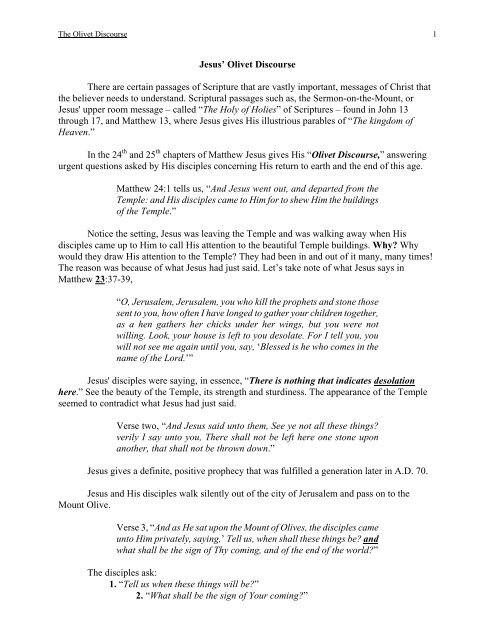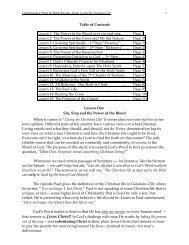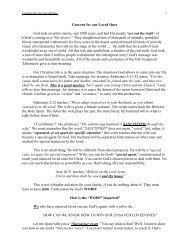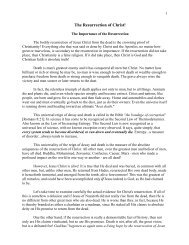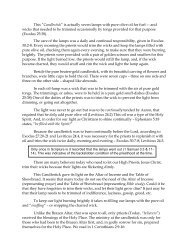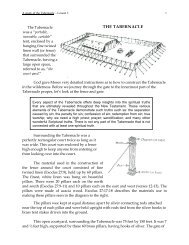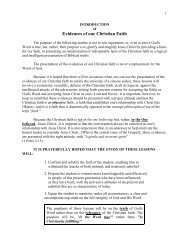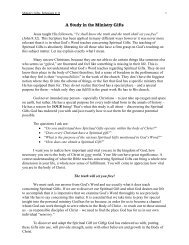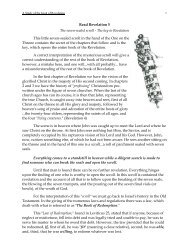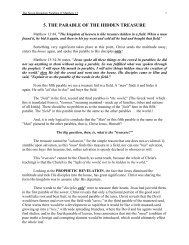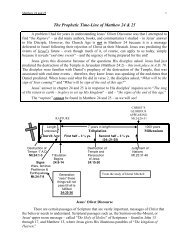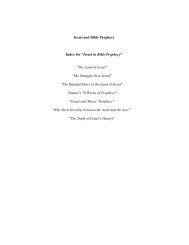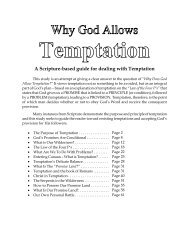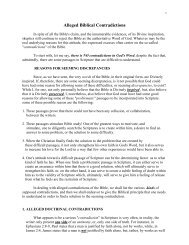Jesus' Olivet Discourse - NetBibleStudy.com
Jesus' Olivet Discourse - NetBibleStudy.com
Jesus' Olivet Discourse - NetBibleStudy.com
You also want an ePaper? Increase the reach of your titles
YUMPU automatically turns print PDFs into web optimized ePapers that Google loves.
The <strong>Olivet</strong> <strong>Discourse</strong> 1<br />
Jesus’ <strong>Olivet</strong> <strong>Discourse</strong><br />
There are certain passages of Scripture that are vastly important, messages of Christ that<br />
the believer needs to understand. Scriptural passages such as, the Sermon-on-the-Mount, or<br />
<strong>Jesus'</strong> upper room message – called “The Holy of Holies” of Scriptures – found in John 13<br />
through 17, and Matthew 13, where Jesus gives His illustrious parables of “The kingdom of<br />
Heaven.”<br />
In the 24 th and 25 th chapters of Matthew Jesus gives His “<strong>Olivet</strong> <strong>Discourse</strong>,” answering<br />
urgent questions asked by His disciples concerning His return to earth and the end of this age.<br />
Matthew 24:1 tells us, “And Jesus went out, and departed from the<br />
Temple: and His disciples came to Him for to shew Him the buildings<br />
of the Temple.”<br />
Notice the setting, Jesus was leaving the Temple and was walking away when His<br />
disciples came up to Him to call His attention to the beautiful Temple buildings. Why Why<br />
would they draw His attention to the Temple They had been in and out of it many, many times!<br />
The reason was because of what Jesus had just said. Let’s take note of what Jesus says in<br />
Matthew 23:37-39,<br />
“O, Jerusalem, Jerusalem, you who kill the prophets and stone those<br />
sent to you, how often I have longed to gather your children together,<br />
as a hen gathers her chicks under her wings, but you were not<br />
willing. Look, your house is left to you desolate. For I tell you, you<br />
will not see me again until you, say, ‘Blessed is he who <strong>com</strong>es in the<br />
name of the Lord.’”<br />
<strong>Jesus'</strong> disciples were saying, in essence, “There is nothing that indicates desolation<br />
here.” See the beauty of the Temple, its strength and sturdiness. The appearance of the Temple<br />
seemed to contradict what Jesus had just said.<br />
Verse two, “And Jesus said unto them, See ye not all these things<br />
verily I say unto you, There shall not be left here one stone upon<br />
another, that shall not be thrown down.”<br />
Jesus gives a definite, positive prophecy that was fulfilled a generation later in A.D. 70.<br />
Jesus and His disciples walk silently out of the city of Jerusalem and pass on to the<br />
Mount Olive.<br />
Verse 3, “And as He sat upon the Mount of Olives, the disciples came<br />
unto Him privately, saying,’ Tell us, when shall these things be and<br />
what shall be the sign of Thy <strong>com</strong>ing, and of the end of the world”<br />
The disciples ask:<br />
1. “Tell us when these things will be”<br />
2. “What shall be the sign of Your <strong>com</strong>ing”
The <strong>Olivet</strong> <strong>Discourse</strong> 2<br />
3. “What will be the signs of the end of the age”<br />
First, the disciples were asking about the destruction of the Temple, however, they then<br />
asked about the “presence” of Jesus, Himself.<br />
We must not take this text out of its setting, or interpret these questions just to make them<br />
fit our belief about prophecy. It is true that <strong>Jesus'</strong> answer leads to a much larger area of prophecy<br />
then their questions, however it is important to remember that <strong>Jesus'</strong> answer began with these<br />
questions. It was these three questions of Jesus’ disciple that prompted and initiated Jesus’<br />
response in this <strong>Olivet</strong> <strong>Discourse</strong>.<br />
You will note that Jesus spoke of wars, plagues, famines, natural disasters, religious<br />
apostasy and intense persecution of the people of God, - these are miserable conditions that will<br />
exist on the Earth just prior to the return of Jesus Christ according to the Bible.<br />
This is not a pleasant scenario, but it is the truth. I didn't make this up! These are the<br />
words of Jesus Himself. He said in verse 8 that these things would be the “beginning of<br />
sorrows,” or literally the “birth pangs,” the world would experience in the Last Days.<br />
As we study , keep in mind that, Matthew 24 begins with Jesus talking to His disciples.<br />
He had just told the multitude of people in Matthew 23 of the woes and judgments that were to<br />
<strong>com</strong>e upon Jerusalem and He had berated the Jewish religious leaders for their self-righteous<br />
hypocrisy. In fact, He called them “hypocrites” seven times in that passage. He also said they<br />
were blind fools, children of hell, and snakes who could not escape damnation – these were<br />
pretty strong words.<br />
Jesus prophesied that the Temple itself, the center of Jewish religious life, would be<br />
destroyed so <strong>com</strong>pletely that not one stone would be left on top of another (Matthew 24:2).<br />
<strong>Jesus'</strong> disciples were amazed at His radical predictions, and they wanted to know three<br />
things: when would all these destruction occur, and what would be the sign of the end of the<br />
world, when Jesus would return<br />
Matthew 24:4-6, “Jesus answered, `Watch out that no one deceives<br />
you, For many will <strong>com</strong>e in My name, claiming, ‘I am the Christ,’<br />
and will deceive many. And ye shall hear of wars and rumors of<br />
wars: see that ye be not troubled: for all these things must <strong>com</strong>e to<br />
pass, but the end is not yet.”<br />
Jesus spent the next verses answering those specific questions the disciples had asked<br />
about, and what Jesus said is still pertinent to us today.<br />
Wars and Rumors of Wars<br />
These verses are a real eye-opener, Jesus said, “Many will make use of My name, but<br />
don’t be deceived by them and don't be troubled, the end is not yet!” Note that Jesus reveals the<br />
answer to their question about the destruction of Jerusalem, but, He tells them, “the end is not<br />
yet.”<br />
Jesus continues in verses 7-8,
The <strong>Olivet</strong> <strong>Discourse</strong> 3<br />
“For nation shall rise against nation, and kingdom against<br />
kingdom: and there shall be famines, and pestilences, and<br />
earthquakes, in divers places. All these are the beginning of<br />
sorrows.”<br />
There are eight sings Jesus mentions that will talk place at the beginning of “Jewish<br />
sorrow.” There are:<br />
1. “Many will make use of My name” – verse 5<br />
2. “They will deceive many” – verse 5<br />
3. “There will be rumors of war” – verse 6<br />
4. “Nation will go to war with nation” – verse 7<br />
5. “Kingdom will fight against kingdom” – verse7<br />
6. “There will be famines” – verse 7<br />
7. “There will be pestilences – verse 7<br />
8. “There will be earthquakes indifferent parts of the world” – verse 7<br />
In verses 9-14 Jesus gives signs that will take place during the time of “Israel’s sorrow,”<br />
the Tribulation period. Jesus states, “THEN” these things will happen . . . ”<br />
1. “They will be delivered to be afflicted” – verse 9<br />
2. “They will be killed” – verse 9<br />
3. “They will be hated of all nations for Christ’s sake” – verse 9<br />
4. “Many will be offended” – [stumble, fall away – lose heart] – verse 10<br />
5. “Many will betray one another” – verse 10<br />
6. “Many will hate one another” – verse 10<br />
7. “There will be many false prophets” – verse 11<br />
8. “Iniquity will abound” – verse 12<br />
“He who endures to the end will be saved” – verse 13<br />
9. “The Gospel of the kingdom [Note: Not the Gospel of salvation, but the<br />
Gospel of the kingdom] preached to all the world for a witness unto all<br />
nations; and then shall the end [not the Rapture – but the end of this age]<br />
<strong>com</strong>e” – verse 14<br />
Verse 15 speaks of the “abomination of desolation spoken of by Daniel the prophet.” The<br />
“abomination of desolation” refers to the Antichrist and his image in the Jewish temple at<br />
Jerusalem during the last 3 1/2 years of this age (Daniel 8:9-14; 9:27; 11:45; 12:1, 7, 11;<br />
Revelation 13:1-18; 14:9-11; 20:4-6).<br />
Jesus predicts the defeat of Israel during this period of time in verses 16-20<br />
Verse 16, “Then let them which be in Judea flee into the mountains” - when Antichrist<br />
enters Judea and takes over the Temple (Daniel 9:27 and 11:40-45). Israel will have to flee from<br />
Judea. The “mountains” referred to is Edom and Moab, where Israel goes to escape the<br />
Antichrist, Revelation 12:6, 14 [See notes in study of Revelation].<br />
Verses 17-18, “Let him which is on the housetop not <strong>com</strong>e down to take any thing out of<br />
his house” – that is, let Israel flee from Judea without taking time for valuables, lest they be<br />
over- taken by Antichrist's armies.
The <strong>Olivet</strong> <strong>Discourse</strong> 4<br />
Verse 19, “Woe unto them that are with child, and to them that give suck in those days.”<br />
It will be hard on women with children or those great with child to flee before the swiftness of<br />
the invaders.<br />
Verse 20, “But pray ye that your flight be not in the winter, neither on the Sabbath day.”<br />
Pray that the invasion will not take place in winter as it would be difficult to flee without<br />
preparation at this time; nor on the Sabbath, because orthodox Jews hold it unlawful to travel<br />
more than a mile on that day (Acts 1:12), so would be overtaken by the invaders.<br />
“For then shall be great tribulation, such as was not since the<br />
beginning of the world to this time, no, nor ever shall be. And except<br />
those days should be shortened, there should no flesh be saved: but<br />
for the elect's sake those days shall be shortened” (Matthew 24:21-22).<br />
In verses 23 through 26 Jesus gives the signs that will take place during the Great<br />
Tribulation, the last 3 and ½ years.<br />
1. “Men will say, ‘Lo here is Christ’” – verse 23<br />
2. “False christs will arise” – verse 24<br />
3. “False prophets will arise” – verse 24<br />
4. “There will be signs and wonders preformed to deceive many” – verse 24<br />
5. “Some will say ‘Christ is in the desert, or some secret place’” – verse 26<br />
Jesus tells of the manner of His <strong>com</strong>ing, when He returns with His saints “in power a<br />
great<br />
glory,” at the end of the Tribulation period.<br />
“For as the lightning <strong>com</strong>eth out of the east, and shineth even unto<br />
the west; so shall also the <strong>com</strong>ing of the Son of man be For wheresoever<br />
the carcase is, there will the eagles be gathered together.<br />
Immediately after the tribulation of those days shall the sun be<br />
darkened, and the moon shall not give her light, and the stars shall<br />
fall from heaven, and the powers of the heavens shall be shaken: And<br />
then shall appear the sign of the Son of man in heaven: and then shall<br />
all the tribes of the earth mourn, and they shall see the Son of man<br />
<strong>com</strong>ing in the clouds of heaven with power and great glory. And he<br />
shall send his angels with a great sound of a trumpet, and they shall<br />
gather together his elect from the four winds, from one end of heaven<br />
to the other” (Matthew 24:27-31).<br />
Verse 32 through 35 gives the parable of the fig tree (the Jewish nation):<br />
“Now learn a parable of the fig tree; When his branch is yet tender,<br />
and putteth forth leaves, ye know that summer is nigh: So likewise ye,<br />
when ye shall see all these things, know that it is near, even at the<br />
doors. Verily I say unto you, This generation shall not pass, till all<br />
these things be fulfilled. Heaven and earth shall pass away, but my<br />
words shall not pass away” (Matthew 24:32-35).
The <strong>Olivet</strong> <strong>Discourse</strong> 5<br />
The generation that witnesses the fulfillment of these signs “will not pass away, until all<br />
these things will be fulfilled!”<br />
When will this happen<br />
“But of that day and hour knoweth no man, no, not the angels of<br />
heaven, but my Father only” (Matthew 24:36).<br />
What Will Christ’s Coming Be Like<br />
“But as the days of Noe were, so shall also the <strong>com</strong>ing of the Son of<br />
man be. For as in the days that were before the flood they were<br />
eating and drinking, marrying and giving in marriage, until the day<br />
that Noe entered into the ark, And knew not until the flood came, and<br />
took them all away; so shall also the <strong>com</strong>ing of the Son of man be.<br />
Then shall two be in the field; the one shall be taken, and the other<br />
left. Two women shall be grinding at the mill; the one shall be taken,<br />
and the other left” Matthew 24:37-41).<br />
Therefore – “Watch, for ye know not what hour your Lord doth <strong>com</strong>e.”<br />
Let’s review some things!<br />
Jesus began the <strong>Olivet</strong> discourse by giving general information about what things would<br />
be like in the Last Days before the end of the world - or literally, in the Greek, at the “end of the<br />
age.” That phrase, “the end of the age,” has the connotation of the end of a distinct period of<br />
time, rather than the ultimate end of everything that exists. So what Jesus is talking about here is<br />
the end of the current “age,” or the period of human history in which we now live.<br />
Jesus said in verse 6, that there would be turmoil on the world-political front because of<br />
“wars and rumors of wars,” with many nations and kingdoms fighting one another. This scenario<br />
has been <strong>com</strong>mon before in human history, but never so widespread as in modern generations.<br />
The 20th Century spawned an unprecedented escalation in the destructive power of<br />
modern warfare and the bloodshed it produces. World War I introduced modern machine guns<br />
and tanks and heavy artillery to the battlefield, as well as poison gas. World War II produced<br />
mass destruction from the air and unleashed the awesome power of the atomic bomb to kill<br />
hundreds of thousands. The Cold War advanced missile technology and nuclear weapons capable<br />
of annihilating all human life on the planet. Hitler, Stalin, MaoTse Tung, and scores of lesser<br />
dictators have <strong>com</strong>bined to make the 20 th century the bloodiest in human history.<br />
The total death toll from the five major wars of the 20th Century - World War I, World<br />
War II, the Korean War, Vietnam, and the Gulf War - stand at a gruesome 59.5 million.<br />
Headlines are filled with reports of conflict in Chechnya and Bosnia and Africa, and<br />
despite our oft-expressed desires for world peace, new conflicts continue to spring up around the<br />
globe. The Middle East is a powder keg waiting to explode, as Iran and Iraq race to acquire more<br />
potent weapons and Israel struggles just to survive. There have also been significant
Jesus’ <strong>Olivet</strong> <strong>Discourse</strong> 6<br />
international geopolitical developments in this century related to wars, not specifically<br />
mentioned in Matthew 24 but found in other prophetic passages. This <strong>com</strong>bination of events<br />
makes our time unique in all of human history and causes serious Bible scholars to believe that<br />
we are definitely living in the Last Days.<br />
See the study on “The Signs of the End Time” for further study<br />
The disciples did not understand the concept of Jesus’ “Advent” – His return to earth.<br />
Like the prophets of the Old Testament, they did not see this present Church Age in God’s<br />
prediction for the future. This concept was revealed to them later [Read Ephesians 2:13-14 and<br />
3:1-6]. They, probably, realized that Jesus would pass from their midst and somehow escape<br />
from the hostility of the Roman rulers, however, they did not understand the concept of His<br />
leaving earth and returning again sometime in the future. They were asking, “If this Temple is to<br />
be destroyed, when will it be If You are <strong>com</strong>ing in judgment, how, and when, will it take<br />
place”<br />
These disciples not understand, nor did they realize anything concerning this present Church<br />
Age. They were puzzled about this prophecy of Jesus and asked, “When will these things be”<br />
“When are You <strong>com</strong>ing” And, “When is the consummation of this present age”<br />
We have the longest answer Jesus ever gave to any question.<br />
Verse 4, “And Jesus answered and said unto them, Take heed that no<br />
man deceive you.<br />
Don't pass over this verse too lightly! Notice first, Jesus warns His disciples lest they be<br />
led astray. He speaks of future things dealing with matters of utmost importance, things of great<br />
peril, and then He tells them, “Don't wonder from the clear declaration of Scripture and arrive<br />
at some fanciful interpretation.”<br />
Jesus began this discourse by words, “Take heed,” or, in modern vernacular, He says,<br />
“Watch out!”<br />
Jesus was careful to discriminate on the three questions they had asked Him.<br />
1. First question, “What is the future for Israel” (Answered in verses 5-35).<br />
2. The answer to the second question shows what is in store for the Church<br />
(Matthew 24:36 to 25:30)<br />
3. <strong>Jesus'</strong> answer to the third question shows the future for the Gentile nations<br />
of the world - (Matthew 25:31-46)<br />
Jesus separates, “these things” – from – “the sign of His <strong>com</strong>ing” – (the questions the<br />
disciples asked in verse 3) – by His statement in verse 27, “For as the lightning <strong>com</strong>eth out of the<br />
east, and shines even unto the west; so shall also the <strong>com</strong>ing of the Son of Man be.” He<br />
continues after saying this by declaring His <strong>com</strong>ing to be followed by “mourning” of the tribes<br />
of the earth, and the “gathering together of all Israel.” And, finally, He says, in verse 36, “But of<br />
that day and hour knoweth no man, no, not the angels of heaven, but my Father only.”
Jesus’ <strong>Olivet</strong> <strong>Discourse</strong> 7<br />
Jesus is extremely careful in removing:<br />
1. “His <strong>com</strong>ing” from the destruction of the Temple<br />
2. He separates “His <strong>com</strong>ing” and “the end of the age,” and<br />
3. “The end of the age” from the destruction of Jerusalem!<br />
For this study, let’s look, in particular, at the prophecies that pertain to us today.<br />
The Church's Responsibility<br />
Beginning with verse 45, Jesus changes the subject matter from future prophetic events to<br />
ask a serious question, thus begins a second part of His message. In this section Jesus<br />
<strong>com</strong>mences with the question, “Who then is the faithful and wise servant” and ends, speaking<br />
of the Church’s present responsibility, in the 30th verse of chapter 25.<br />
In this passage of Scripture, (Matthew 24:45 through 25:30), Jesus does not once refer to<br />
Himself as “the Son of man” (The King James does mention the title in 25:13, however, it is not<br />
in the original, and other translations have left it out). The point is: The title, “Son of man” was<br />
the one by which Jesus most often described Himself in the days of His earthly ministry. He<br />
never called Himself “the Son of God,” except when it was necessary in order to answer to<br />
criticism, or inquiry, or investigation concerning the deepest truth concerning Himself. This title,<br />
“Son of man,” was one that indicated His relation to the purpose of establishing the heavenly<br />
Kingdom on earth.<br />
This was the purpose included in the mission of Christ and does not, for a moment, to<br />
deny the fact that Jesus came to seek and to save lost men individually, to change men, that when<br />
this probationary life is over, they shall enter into the home, the joy and the rest He promises to<br />
all believers.<br />
However, if anyone thinks of the mission of Jesus as one simply of saving men here on<br />
earth, in order that they may be ready for the life beyond, then they have misread all that He ever<br />
said, all He ever did and taught us to pray for. He taught us to pray, “that the Kingdom might<br />
<strong>com</strong>e, and the will of God be done, on earth as in heaven.”<br />
It is very significant that this title, “the Son of man” drops out of use in the writings of the<br />
New Testament and is never found in the epistles, and is not referred to in all the rest of the New<br />
Testament, until this title, “the Son of Man,” <strong>com</strong>es into sight again in the book of Revelation,<br />
where the title, “Son of man,” re-appears.<br />
Here in Matthew, chapters 24 and 25, the title, “the Son of Man,” appears in the first part,<br />
again immediately at the 31st verse of the 25th chapter, in the third section of the <strong>Olivet</strong><br />
discourse, when Christ states, “When the Son of man shall <strong>com</strong>e in His glory!”<br />
This second section of the <strong>Olivet</strong> <strong>Discourse</strong> (Matthew 24:45 to 25:30) has no references<br />
to Prophets, the Temple, the Sabbath day - no references to any of those sacred signs and<br />
symbols of the old economy, which indicated the truth concerning the government of God in the<br />
world during the days of the Old Testament. The time of the employment of these means passed<br />
forever away with the beginning of the age of His redeeming reign.
Jesus’ <strong>Olivet</strong> <strong>Discourse</strong> 8<br />
This passage consist of three parables, indicating the responsibilities resting upon those<br />
whom Christ was leaving in charge during a period in which He (as to bodily presence) would be<br />
absent from them.<br />
Let's now read this passage, Matthew 24:45-25:30, and then I want to share what I<br />
believe to be insight into what Jesus was teaching here.<br />
Keep in mind that in the midst of this Oliver <strong>Discourse</strong>, (Matthew 25:45), Jesus asks this<br />
essential and crucial question, “Who then is the faithful and wise servant, whom the master has<br />
put in charge of the servants in his household to give them their food at the proper time"<br />
Keep in mind that Matthew 24:36, through 44, Jesus deals with the immanency [that His<br />
<strong>com</strong>ing will be unexpected – any moment] and the important theme of the believer being ready.<br />
Jesus had been speaking of the “people of earth,” however He then changes, in Matthew<br />
24:45, from the prediction of future events to give a revelation of the present responsibility of the<br />
Church. From the question in 24:45, through chapter 25:31 is a prophecy that deals with the<br />
Church's responsibility during this present age.<br />
After characterizing two kinds of servants, beginning with Matthew 24:46 and running<br />
through the rest of the <strong>Olivet</strong> discourse, He gives three parables:<br />
1. The Parable of the Household<br />
2. The Parable of the 10 Virgins<br />
3. The Parable of the Talents<br />
Jesus tells of the manner of His <strong>com</strong>ing in 24:44, “So you also must be ready, because<br />
the Son of Man will <strong>com</strong>e at an hour when you do not expect Him.” He speaks of days that are to<br />
<strong>com</strong>e when the Son of Man shall be manifested. However, now, in this day, He is still a<br />
“servant.”<br />
Matthew 24:46-51 gives a picture of rebellious souls, rejecting Him, saying, “He delays<br />
His <strong>com</strong>ing.” They smite their fellowmen, and are drunken, but still He is patient. However,<br />
there is <strong>com</strong>ing a day when His eyes will flash and He will descend from heaven in fire and<br />
flame, flashing glory. He will cast out all evil and take vengeance.<br />
Jesus teaches that the purpose and mission of Christ in this day of God’s grace – in this<br />
Church Age – is to seek and to save the lost. Today, we are living in a probationary period, but<br />
someday that time will be over.<br />
If anyone thinks of the mission of Jesus as simply saving men in order to take them to a<br />
life beyond, they have misread what Jesus taught – and what He prayed for!<br />
Jesus turns from the negative survey to a more positive one beginning with Matthew<br />
24:46, running through 25:30. This passage consists of three parables, indicating the<br />
responsibilities that rest upon the Church. Christ's bodily presence would be absent from the<br />
earth, but He would be present through His Mystical body, the Church.
Jesus’ <strong>Olivet</strong> <strong>Discourse</strong> 9<br />
NOTE THE SIMILARITIES OF THESE THREE PARABLES<br />
1st Parable: Matthew 24:42-51, “Therefore keep watch, because you do not know on<br />
what day your Lord will <strong>com</strong>e. But understand this: If the owner of the house had known at what<br />
time of night the thief was <strong>com</strong>ing, he would have kept watch and would not have let his house be<br />
broken into. So you also must be ready, because the Son of Man will <strong>com</strong>e at an hour when you<br />
do not expect him. Who then is the faithful and wise servant, whom the master has put in charge<br />
of the servants in his house- hold to give them their food at the proper time It will be good for<br />
that servant whose master finds him doing so when he returns. I tell you the truth, he will put<br />
him in charge of all his possessions. But suppose that servant is wicked and says to himself, ‘My<br />
master is staying away a long time,’ and he then begins to beat his fellow servants and to eat and<br />
drink with drunkards. The master of that servant will <strong>com</strong>e on a day when he does not expect<br />
him and at an hour he is not aware of. He will cut him to pieces and assign him a place with the<br />
hypocrites, where there will be weeping and gnashing of teeth.”<br />
2nd parable Matthew 25:1-13, “At that time the kingdom of heaven will be like ten virgins<br />
who took their lamps and went out to meet the bridegroom. Five of them were foolish and five<br />
were wise. The foolish ones took their lamps but did not take any oil with them. The wise,<br />
however, took oil in jars along with their lamps. The bridegroom was a long time in <strong>com</strong>ing, and<br />
they all became drowsy and fell asleep. At midnight the cry rang out: ‘Here’s the bridegroom!<br />
Come out to meet him!’ Then all the virgins woke up and trimmed their lamps. The foolish ones<br />
said to the wise, ‘Give us some of your oil; our lamps are going out.’ ‘No,’ they replied, ‘there<br />
may not be enough for both us and you. Instead, go to those who sell oil and buy some for<br />
yourselves.’ But while they were on their way to buy the oil, the bridegroom arrived. The virgins<br />
who were ready went in with him to the wedding banquet. And the door was shut. Later the<br />
others also came. ‘Sir! Sir!’ they said. ‘Open the door for us!’ But he replied, ‘I tell you the<br />
truth, I don't know you.’ Therefore keep watch, because you do not know the day or the hour.”<br />
3rd Parable, Matthew 25: 14-30, “Again, it will be like a man going on a journey, who<br />
called his servants and entrusted his property to them. To one he gave five talents of money, to<br />
another two talents, and to another one talent, each according to his ability. Then he went on his<br />
journey. The man who had received the five talents went at once and put his money to work and<br />
gained five more. So also, the one with the two talents gained two more. But the man who had<br />
received the one talent went off, dug a hole in the ground and hid his master's money. After a<br />
long time the master of those servants returned and settled accounts with them. The man who<br />
had received the five talents brought the other five. ‘Master,’ he said, ‘you entrusted me with five<br />
talents. See, I have gained five more.’ His master replied, ‘Well done, good and faithful servant!<br />
You have been faithful with a few things; I will put you in charge of many things. Come and<br />
share your master's happiness!’ The man with the two talents also came. ‘Master,’ he said, ‘you<br />
entrusted me with two talents; see, I have gained two more.’ His master replied, ‘Well done,<br />
good and faithful servant! You have been faithful with a few things; I will put you in charge of<br />
many things. Come and share your master's happiness!’ Then the man who had received the one<br />
talent came. ‘Master,’ he said, ‘I knew that you are a hard man, harvesting where you have not<br />
sown and gathering where you have not scattered seed. So I was afraid and went out and hid<br />
your talent in the ground. See, here is what belongs to you.’ His master replied, ‘You wicked,<br />
lazy servant! So you knew that I harvest where I have not sown and gather where I have not<br />
scattered seed Well then, you should have put my money on deposit with the bankers, so that<br />
when I returned I would have received it back with interest. Take the talent from him and give it
Jesus’ <strong>Olivet</strong> <strong>Discourse</strong> 10<br />
to the one who has the ten talents. For everyone who has will be given more, and he will have an<br />
abundance. Whoever does not have, even what he has will be taken from him. And throw that<br />
worthless servant outside, into the darkness, where there will be weeping and gnashing of<br />
teeth.’”<br />
THE SIMILARITIES IN EACH PARABLE:<br />
(I) THE MASTER IS ABSENT<br />
1. The master of the household, <strong>com</strong>mits certain duties to his servants<br />
and then, he is absent!<br />
2. The bridegroom is absent<br />
3. The master (owner of goods) gives talents to his servants<br />
and then, he is absent<br />
(II) THE RELATIONSHIP OF THE ABSENT MASTER<br />
(with those from whom he is absent)<br />
1. The servants represent his authority<br />
2. The "waiting" of the virgins attest to their belief in his return<br />
3. The servants prosecuted the master's business, with his goods<br />
- the talents - which he gave to them - are all his goods<br />
- not their ability - not their capacity<br />
- the talents do not stand for quality, but for quantity in this parable!<br />
(III) THE RESPONSITILITY WAS ALWAYS TO THEIR MASTER ALONE<br />
1. The servant’s responsibility to the absent master<br />
2. The virgins responsible to be ready at any given moment<br />
3. The servants who received talents and their responsibility to the master<br />
THE DIFFERENCES BETWEEN THE PARABLES:<br />
1. Pictures of the master's household’s COMMUNAL responsibility<br />
2. Pictures the INDIVIDUAL soul’s relation to his master,<br />
showing the wise and the foolish<br />
3. Pictures the responsibility of carrying out master's enterprise in the world.<br />
We will not, at this time, take these parables in all its detail, but look at them as a
Jesus’ <strong>Olivet</strong> <strong>Discourse</strong> 11<br />
“whole.”<br />
1. The parable of the Household gives the two examples, those who are faithful<br />
and wise and those who are called, “The wicked.” This parable presents the<br />
Church as a household, over which Christ is Master.<br />
2. The parable of the 10 Virgins shows our attitude toward Christ in the days of<br />
His absence.<br />
3. The parable of the Talents show our responsibility of Christ's enterprises<br />
First, let’s look at the parable of the Household. Here, the church is Christ's household.<br />
He is the Master Who has left us in charge of is household.<br />
The Greek word, translated “household,” is found only one other time in the Scripture.<br />
It’s in Revelation 22:2, where it states, “the leaves of the tree were for the healing of the<br />
nations.” Note, here, that this same Greek word is translated as “healing.”<br />
What relation can there be between “healing” and “household” This question can only<br />
answered by an understanding of what this word translated as, “household” really signifies. It is<br />
a word from which we derive our word “therapeutic.” The basic idea of this word is healing.<br />
This word “household” refers to those in the house that serve.<br />
Look at Matthew 24:45 again, “Who then is the faithful and wise servant” This word<br />
translated as “servant” is the word, “bond-slave,” while the Greek word translated “household”<br />
also means “ servant,” it <strong>com</strong>e from an entirely different word – a Greek word meaning “one<br />
who performs a loving service” – or, “one whose purpose is to bring about a healing in service.”<br />
This is a case of “metonymy,” – meaning, “the use of a word for that of another to which<br />
it is related, to emphasize a concept.” For instance, we say, “A man keeps a good table,” when<br />
we are really referring to his food – or, we might use the word “scepter” when referring to<br />
sovereignty.<br />
This word, “household,” found in Matthew 24:45, is a parable suggesting the picture of a<br />
great house, with one Master. All those in the house are under His control. Their interests are<br />
constantly in His thoughts, while they are serving under His <strong>com</strong>mand.<br />
Jesus uses the word that indicates the love principle in service – the tender healing<br />
ministry that only grows out of love. Thus, in a word, flaming and flashing with meaning, we<br />
discover our Lord's conception of His Church during the time of His absence.<br />
His “household” serve, however, they serve by love – and their ministry is a healing<br />
ministry.<br />
Note Matthew 24:45 carefully, “Who then is the faithful and wise servant, whom his lord<br />
hath set over his household” This word, “household,” must be interpreted by the consistent<br />
teaching of the Lord, that service is the condition of greatness!
Jesus’ <strong>Olivet</strong> <strong>Discourse</strong> 12<br />
The servant is “set over” – made ruler over; put in charge – he is a servant. Jesus taught<br />
“Whosoever would be first among you, shall be servant of all” (Mark 9:35 and 10:44).<br />
This is not a picture of one in an official authority, but rather, it is a picture of one in the<br />
exercise of the ministry of healing – and of love!<br />
SERVICE IS THE CONDITION FOR GREATNESS<br />
We see the attitude of a faithful and wise servant. One who expresses an attitude of<br />
caring for all others while His Lord is away.<br />
The attitude of “the evil servant” who says, “My master is staying alway a long time”<br />
(delays his <strong>com</strong>ing) and he turns to an evil course, instead of feeding and caring for the<br />
household. He “beats” them and, then, turns to <strong>com</strong>panions of drunkards.<br />
TWO RESULTS WHEN THE MASTER RETURNS:<br />
1. The servant who was loyal is promoted and put in a place of authority.<br />
2. The unfaithful servant is cut asunder and cast out.<br />
We <strong>com</strong>e to chapter 25<br />
We must not carry this parable farther than God meant it to go. Jesus is teaching that we<br />
prove our loyalty in the Church to our Lord by the way we serve one another. Disloyalty beats<br />
and slays the brethren.<br />
In the parable of the Virgins, we see two attitudes – the attitude of the wise and the<br />
attitude of the foolish. They all “went forth,” however, some of them were careless. This parable<br />
is not a story of service, but rather, one of personal relationship.<br />
There is no apparent difference between the ten virgins. They all spoke of their desire to<br />
meet the Bridegroom. Jesus, in this parable, is not speaking of particular section of Christendom,<br />
as some teach, but rather He is speaking of individual souls in relation to the Master.<br />
Nothing is said in this parable about the “responsibility in the household,” but rather, it<br />
speaks of the “attitude of the individual toward the Master.” It speaks of those who have no<br />
eyes, no thought, no care, except for Bridegroom and the hour of His <strong>com</strong>ing.<br />
The Last Parable in Jesus’ <strong>Olivet</strong> discourse begins with, “For the<br />
kingdom of heaven is as a man traveling into a far country, who<br />
called his own servants, and delivered unto them his goods”<br />
(Matthew 25:14).<br />
This parable speaks of the faithful use of talents brought the Master's “Well done thou<br />
good and faithful servant, thou hast been faithful over a few things, I will set thee over many<br />
things.” One of servants was unfaithful – his life is exposed, his talents are recalled and he is<br />
“cast out.”
Jesus’ <strong>Olivet</strong> <strong>Discourse</strong> 13<br />
Note, again, that in the first Parable reveals the mutual ministry that is to exist within the<br />
household, Matthew 24:46-51. We are to care for, and feed, others, not ill-treat, or beat, our<br />
fellow servants.<br />
The second Parable reveals what our personal life must be within the church, Matthew<br />
25:1-13. It is to be an attitude of loyalty of love to Jesus Christ. Our love will be tested in loyalty<br />
in small, seemingly insignificant, things.<br />
The third Parable reveals our responsible for Master's work, Matthew 25:14-30. Jesus has<br />
<strong>com</strong>mittee to us His goods and, in His absence, we are to represent Him to this world during this<br />
Church age.<br />
1. The “household” at peace!<br />
2. Lamps burning - ready!<br />
3. The individual character is using his talents (working) for eternity!


